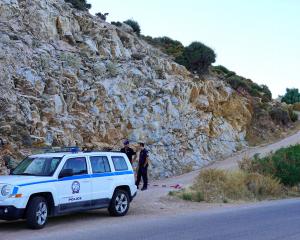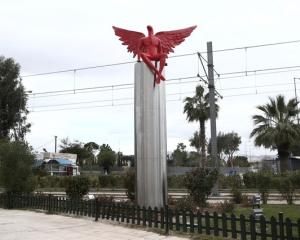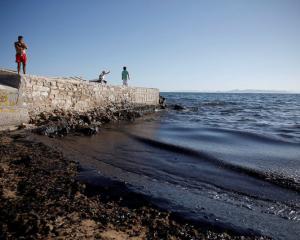In a blow to confidence, the European Central Bank said it had halted liquidity operations with some Greek banks because their capital was too depleted. That means they can no longer offer assets to the ECB as collateral for loans, and would have to seek costlier emergency financing from the Bank of Greece.
It was not immediately clear which banks, or how many of them, were affected. One person familiar with the matter said the capital of four Greek banks was so low that they were operating with negative equity.
Greeks have withdrawn hundreds of millions of euros from banks in recent days as fears grow that the country might be forced out of the euro zone, although there has been no sign of a run on Athens bank branches.
Political leaders failed to form a coalition after an inconclusive election on May 6 when parties opposed to the austerity terms of Greece's international bailout did well. This raised the chance that the rescue funds could be halted, pushing the country towards bankruptcy and a departure from the euro.
ECB President Mario Draghi said that the EU treaty did not give his bank responsibility for the euro zone's composition.
"I want to state that our strong preference is that Greece will continue to stay in the euro zone," he said in Frankfurt. However, he added: "Since the treaty does not foresee anything on (an) exit, this is not a matter for the ECB to decide."
President Karolos Papoulias named supreme administrative court head Panagiotis Pikrammenos as caretaker prime minister.
Pikrammenos will have no power to take political decisions, only to lead Greece to the vote. The parliament that was elected on May 6 will convene on Thursday and be immediately dissolved, a presidency source said.
The interim leader, who was sworn in at a brief ceremony presided over by Archbishop Ieronimos on Athens on Wednesday, is little known. State television said he was born in 1945 and studied law in Athens and Paris.
"Thank you for your trust, and I believe that I am worthy of this mission," Pikrammenos said at a meeting with the president. "This is purely a caretaker government. However, it escapes no one that our country is going through difficult times."
Pikrammenos, who noted that his name means "sorrowful", is due to unveil his government later on Wednesday.
Socialist leader Evangelos Venizelos, the former finance minister, hinted at the latest problems afflicting the banks, saying the caretaker government would have to deal with the issue of bank recapitalisation and pointing out that banks' capital adequacy was a cause for concern.
LEFTISTS LEAD
A new opinion poll confirmed what other surveys have shown: that radical leftists who reject the bailout agreed with the European Union and International Monetary Fund are poised for victory, and the two establishment parties that agreed the rescue are sinking further.
The leftists argue they can tear up the bailout deal and keep the euro, but European leaders say if Greece fails to meet promises to them, lenders will pull the plug on financing.
On Monday, the president told party chiefs that figures from the central bank headed by George Provopoulos showed savers had withdrawn up to 800 million euros ($1 billion) from banks.
"Mr. Provopoulos told me there was no panic, but there was great fear that could develop into a panic," Papoulias was quoted as saying in minutes of a meeting to discuss a coalition.
Several banking sources told Reuters that similar amounts had also been withdrawn on Tuesday. Nevertheless, there was no sign of panic or queues at bank branches in Athens on Wednesday. Bankers dismissed suggestions that a bank run was looming.
A senior executive at a large Greek bank told Reuters: "There is no bank run, no queues or panic. The situation is better than I expected. The amount of deposit withdrawals the president mentioned referred to three days, not one."
Still, some were taking no risks. A 60-year-old textiles store owner who gave his name only as Nasos said he had transferred 10,000 euros over the phone to a bank in fellow euro zone state Cyprus on Tuesday afternoon.
"Any way you see it, things are difficult. If they call elections on June 17 - a Sunday - then everyone will take their money out on the Friday." That June 17 date was later confirmed.
Greeks have already been withdrawing their savings from banks at a sharp clip - nearly a third of bank deposits were withdrawn between January 2010 and March 2012, reducing total Greek household and business deposits to 165 billion euros.
Charles Dallara, chief negotiator for the body representing private sector holders of Greek bonds, said there had been "a pickup in deposit flight from Greece".
Dallara, who as head of the International Institute of Finance spent months negotiating the largest ever sovereign debt restructuring, said a Greek exit from the euro zone would be "somewhere between catastrophic and Armageddon" for Europe.
BANK WITHDRAWALS
Analysts predicted Greece would avoid a bank run, if only because so many people have pulled out their savings already.
"We have witnessed periods of tension before when the banks experienced large outflows. In my view, the majority of people with these concerns would have done so by now," said Alex Tsirigotis, Greek banks analyst at Mediobanca.
The spectre of Greece quitting the single currency sent the euro and European shares to a fresh four-month low on Wednesday and raised the yields on Spanish and Italian debt, reflecting the risk that other European countries will be hurt.
Greece's two wounded establishment parties hope to persuade voters that the election will be a referendum on the euro, which nearly 80 percent of Greeks say they want to keep. The view from Brussels is clearly that Greek euro membership is now at stake.
"It is important that the Greek people now take a decision fully informed about the consequences," European Commission President Jose Manuel Barroso told a news conference.
"The ultimate resolve to stay in the euro area must come from Greece itself," Barroso said. "We must tell the people that the programme for Greece is the least difficult of all the difficult alternatives."









